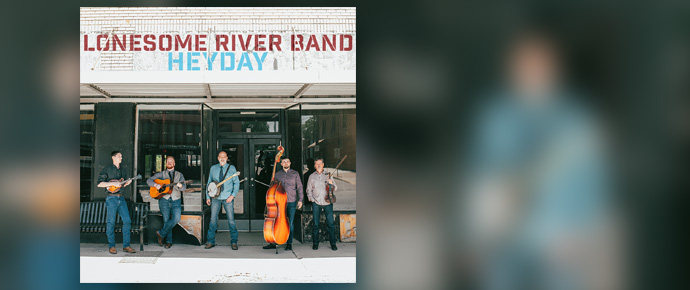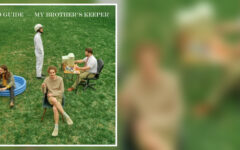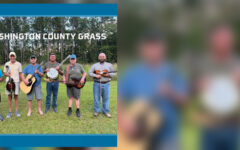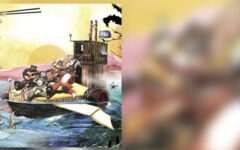
The Lonesome River Band is truly a unique group in the world of bluegrass music. Having operated under the same name for over three decades, and with a trail of hits leading back to the early 1990s, they are arguably one of the most influential groups on today’s popular modern traditional style. Though there have been a number of lineup changes over the years, the LRB has consistently offered listeners strong, traditionally-influenced music that continues to be fresh and updated without relying on retreads of old standards. Their latest album from Mountain Home Music Company, Heyday, is yet another strong offering from a band that has honestly helped define the sound of bluegrass for an entire generation.
Heyday finds the band at a transition point. Recorded during a fairly big shakeup in the group’s membership, the album features both longtime members Brandon Rickman and Barry Reed (who both departed in 2021) and their replacements, up-and-comers Adam Miller and Kameron Keller. While this may throw off the game of lesser bands, there’s no discernible difference here between the two lineups. In fact, the new lineup (featuring Miller on lead vocals) has already scored its first number one with Mary Ann is a Pistol, a bluesy Dennis Linde song about a hot-blooded woman who’s not letting any man slow her down. With a nice groove set by Sammy Shelor’s banjo and smooth vocals from Miller, it’s a great track to the open the album.
Miller also takes the lead on the group’s latest single, the nostalgic title track. Sung from the perspective of a once-prosperous small town, it’s sure to strike a chord with many listeners who remember better times in their own hometowns. Mike Hartgrove’s fiddle and guitar from Jesse Smathers work well together to set a gentle, melancholy feel that nicely matches the lyrics. Rickman, no stranger to nostalgic songs himself, offers a thoughtful, introspective take on the ins and outs of a life well lived on That’s Life. A co-write from Rickman and Billy Droze, it’s a fine showcase of Rickman’s warm, country-style vocals and the easygoing style he lent to the band for close to twenty years.
Another excellent track here is Cumberland River Shore, penned by Billy Smith and Matt Combs as a tribute to the late, great John Hartford. Fans of Hartford will be able to pick out shades of his style in Shelor’s banjo (especially the song’s opening), the overall melody, and the story of a rambling riverman. A fun toe-tapper that’s sure to have folks up dancing at live shows, Smathers does a great job on lead vocals. His harmonies with Rickman on the chorus are especially of note. The two also do a fine job trading vocals on Jesse James, an update of a song from a 1980s Civil War concept album by Jimmy Arnold. As such, the lyrics focus more on James’s experiences during the war than on his more well-known bank-robbing days. It’s an interesting, melody-driven song with a stripped-back arrangement focusing on banjo and fiddle.
As with any bluegrass album worth its salt, there are a handful of strong heartbreak songs, including Waitin’ on a Train. Written by Greg Preece, it’s a straightforward, driving track that finds the singer spending his days staring at the train tracks, wondering where his wayward woman has gone. Headed North finds the singer on the other side of the break-up situation, running as fast as he can from a woman’s “ice-cold heart.” Featuring some hot mandolin from Smathers and pure drive from Shelor, its sound is classic LRB. Yet another take on lost love is Come on Down from the Mountain Top, a fun song with a bouncy old-time vibe. Miller’s lead vocal here is one of his best on the album, finding him longing for a woman who, like many bluegrass heartbreakers before her, left him for the bright lights of the city.
Heyday is a very strong album full of well-written songs and tight musical arrangements from a band that very rarely, if ever disappoints. Many modern traditional bands these days tend to box themselves into one style, making albums grow repetitive with songs that all sound the same. The Lonesome River Band most certainly does not have that problem. With plenty of variety in both sound and lyrical content, this is an enjoyable album from beginning to end.
For more information on the Lonesome River Band, visit them online. Their new album is available from a variety of online music retailers.







